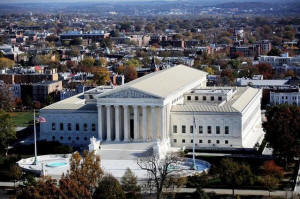|
Top court leaves in place Texas ruling
questioning gay spousal benefits
 Send a link to a friend
Send a link to a friend
 [December 05, 2017]
By Andrew Chung [December 05, 2017]
By Andrew Chung
WASHINGTON (Reuters) - The U.S. Supreme
Court on Monday refused to hear Houston's appeal of a lower court ruling
that threw into doubt the city's spousal benefits to gay married
municipal employees, allowing a case that tests the reach of the
landmark 2015 decision legalizing same-sex marriage nationwide to
proceed.
The justices left intact a June ruling by the Republican-dominated Texas
Supreme Court that revived a lawsuit backed by a conservative group
aimed at blocking Houston from offering such benefits.
"This is an incredible early Christmas present from the U.S. Supreme
Court for taxpayers," Jonathan Saenz, president of Texas Values, a
conservative group that advocates "biblical, Judeo-Christian values"
that backed the lawsuit, said in a statement.

The high court's action set no nationwide precedent but may give a boost
to conservative legal efforts to limit the effects of its decision in
the case Obergefell v. Hodges that the fundamental right to marry is
guaranteed to gay couples under the U.S. Constitution.
The case will now proceed in a Texas state court, which could decide to
stop the benefits offered by the fourth most populous U.S. city. Such a
ruling again could be appealed to the nation's top court.
Houston City Attorney Ron Lewis said that in the meantime the city's
policy to provide the benefits will remain in effect.
In another case involving the scope of protections provided by the
Obergefell decision, the Supreme Court in June overturned a state court
ruling that had allowed Arkansas to refuse to list both same-sex spouses
on birth certificates.
The Supreme Court on Tuesday will hear another important case involving
gay rights, a conservative Christian baker's assertion that the
Constitution protected his right to refuse to make a cake for a gay
married couple in violation of his religious beliefs.
[to top of second column] |

The U.S. Supreme Court building in Washington, DC, U.S. on November
15, 2016. REUTERS/Carlos Barria/File Photo

The Houston case began in 2013 when Jack Pidgeon, a local Christian
pastor, and Larry Hicks, an accountant, sued the city after Annise
Parker, a Democrat who was its first openly gay mayor, gave
municipal spousal benefits such as health insurance and life
insurance to same-sex married couples.
Pidgeon and Hicks, also backed by state Republican leaders, argued
that the benefits violated the Texas constitution and state and
local laws against same-sex marriage. A state trial court initially
sided with them, but after the 2015 Obergefell decision, an appeals
court reversed that ruling.
Lawyers for Pidgeon and Hicks told the state Supreme Court that the
Obergefell ruling should be interpreted narrowly and did not require
states to give taxpayer subsidies to same-sex couples any more than
the U.S. Supreme Court's 1973 Roe v. Wade decision legalizing
abortion required states to subsidize abortions.
In June, the Texas Supreme Court threw out the ruling favoring
Houston, agreeing that the Obergefell decision "did not hold that
states must provide the same publicly funded benefits to all married
persons," and remanded the case back to the trial court to allow the
men to make their arguments again.
The city and current Houston Mayor Sylvester Turner, also a
Democrat, appealed to the U.S. Supreme Court, saying the dispute had
already been settled because the Obergefell ruling extended to
married same-sex couples the "constellation of benefits that the
states have linked to marriage."
(Reporting by Andrew Chung; Additional reporting by Jon Herskovitz;
Editing by Will Dunham)
[© 2017 Thomson Reuters. All rights
reserved.]
Copyright 2017 Reuters. All rights reserved. This material may not be published,
broadcast, rewritten or redistributed. |